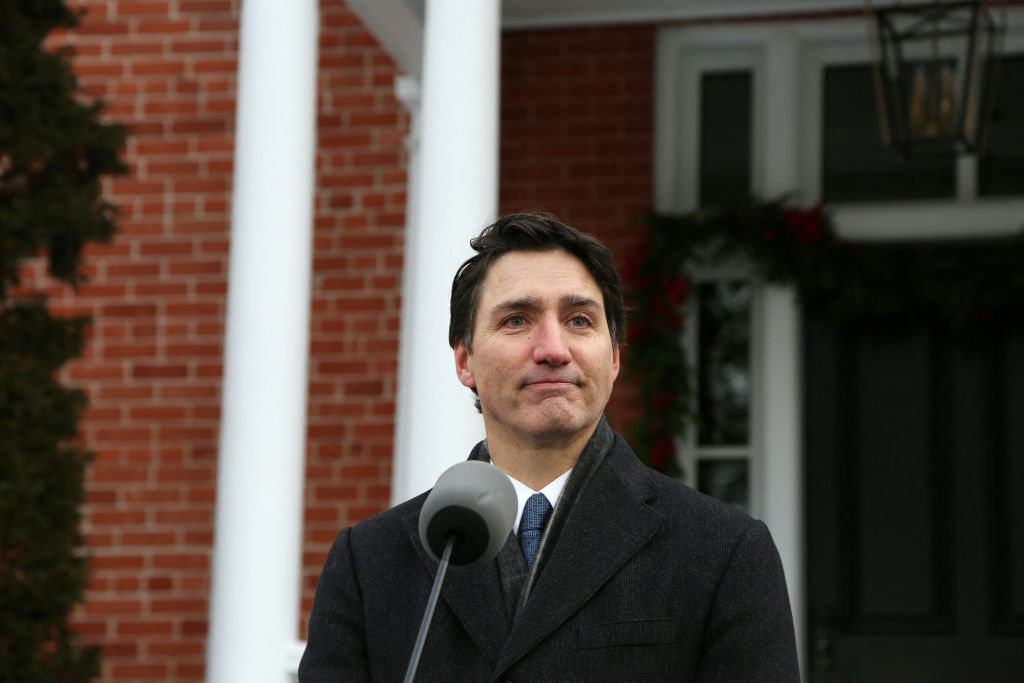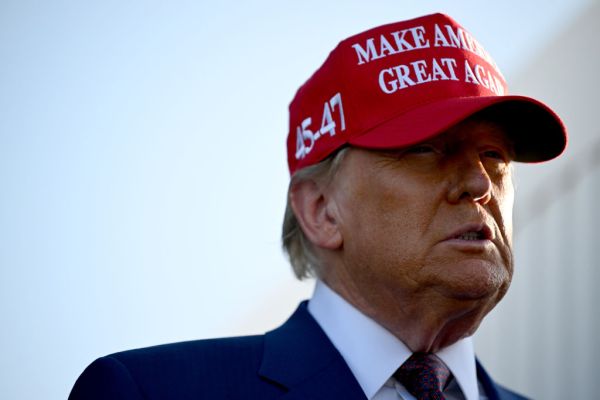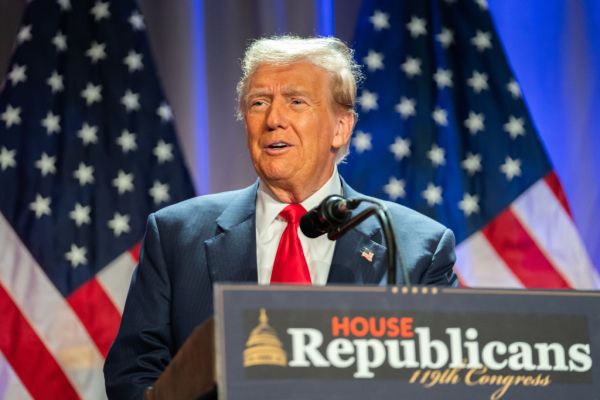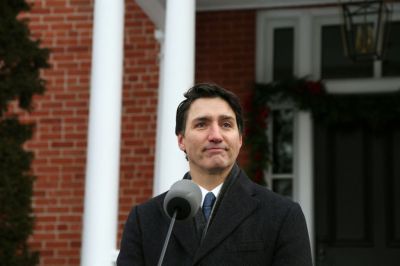Happy Thursday! As much as we at TMD love new technology, we’ll take an overly talkative Uber driver over whatever this is every time.
Quick Hits: Today’s Top Stories
- Wildfires in the Los Angeles area continued to rage out of control on Wednesday, killing at least five people and displacing more than 100,000. Fueled by winds with gusts of up to 100 mph, the flames have overwhelmed firefighters—all three water storage tanks for fire hydrants in the Pacific Palisades area were empty by early Wednesday morning, leaving little to no water pressure. High winds grounded firefighting aircraft until the early afternoon, and a third wildfire broke out Wednesday evening that threatened an area near Hollywood Boulevard. The fires have destroyed nearly 2,000 buildings and burned through 25,000 acres. At California Gov. Gavin Newsom’s request, President Joe Biden approved a disaster declaration for the state Wednesday, directing the Defense Department to deploy additional firefighters and equipment to the affected areas.
- President-elect Donald Trump filed an emergency motion Wednesday with the Supreme Court requesting that sentencing in his New York criminal case, scheduled for Friday, be delayed. Trump’s lawyers argued in a filing that the former president is immune from both prosecution and sentencing based on the Supreme Court’s presidential immunity decision last July. They made a similar argument to a New York appeals court, which denied the request Tuesday. The Supreme Court requested that the case’s prosecutors respond to Trump’s filing by Thursday, suggesting the court could make a decision before the sentencing.
- Russia launched a missile attack against Ukraine’s southern city of Zaporizhzhia on Wednesday, killing 13 people and injuring 60 others in the deadliest single strike in weeks. The bombing came just a few hours after the Ukrainian military announced a drone strike on a key Russian oil depot in Engels, a city more than 300 miles from the Ukrainian border. Ukrainian officials said the depot supplies fuel to a military airfield hosting Russian strategic nuclear bombers.
- A South Korean court on Tuesday re-issued an arrest warrant for President Yoon Suk Yeol on charges of abuse of authority and orchestrating a rebellion. Last week, police called off arresting Yoon after a six-hour standoff between police and the impeached president’s security detail. Yoon’s detail has spent recent days increasing security at his private residence—where he is currently holed up—using buses to barricade the entrance. Protesters have gathered outside the residence in recent days, with Yoon’s supporters pledging to prevent authorities from executing the arrest warrant.
- Attorney General Merrick Garland said Wednesday he plans to release special counsel Jack Smith’s final report on his investigation into Trump’s efforts to overturn the 2020 election. Garland detailed his plans in a filing requesting the 11th Circuit Court of Appeals lift Judge Aileen Cannon’s injunction temporarily barring the Justice Department from releasing a two-volume report. Cannon’s order on Tuesday came in response to emergency motions from Trump’s co-defendants in the classified documents case seeking to block the report’s release, given that the second volume pertains to the pending case. The attorney general argued there is “neither any need nor legal basis” for the injunction, because he does not intend to release the second volume while the cases against the co-defendants are pending.
- The Israeli military said on Wednesday that it discovered the body of October 7 hostage Youssef Alzyadni—along with evidence that his son, Hamza, may also have been killed—in tunnels beneath Rafah in Gaza. The announcement comes as the Biden administration and Trump both pressure Israel and Hamas to reach a ceasefire-for-hostage release deal before Trump’s inauguration on January 20. “We’re very close,” Secretary of State Antony Blinken said in a press conference Wednesday. Israel believes that 99 hostages, living and dead, remain in Gaza.
Justin Trudeau’s Downfall

Throughout the waning weeks of 2024, a growing chorus of Canadian lawmakers—including many members of Prime Minister Justin Trudeau’s own Liberal Party—urged Canada’s embattled leader to “take a walk in the snow.” The saying isn’t a bizarre northern death threat. It’s a reference to an episode in the life of Trudeau’s father, Pierre, who took a walk during a snowy night in 1984 before deciding to resign his premiership.
Nearly 40 years later, the younger Trudeau has come to the same decision.
“I intend to resign as party leader, as prime minister, after the party selects its next leader through a robust, nationwide, competitive process,” Trudeau said in a speech outside his Ottawa home on Monday. “This country deserves a real choice in the next election and it has become clear to me that if I’m having to fight internal battles, I cannot be the best option in that election.”
Trudeau’s decision, while certainly welcomed by large numbers of Canadians, throws the country’s politics into turmoil as it faces a potential trade battle with President-elect Donald Trump.
Trudeau, burdened by cratering popularity among Canadian voters, was finally forced to step down after the resignation of his deputy prime minister and finance minister, Chrystia Freeland, last month. Freeland quit over Trudeau’s recent attempts to appease voters angry about inflation: In November, he announced tax breaks on consumer goods like alcohol, restaurant meals, and toys, and sent roughly 19 million Canadians “relief” checks amounting to $250 Canadian dollars each (about $170 U.S. dollars).
Unsurprisingly for a finance minister, Freeland opposed using inflationary policies to combat inflation. She also argued that Trudeau was being dangerously profligate as Canada stared down Trump’s threats of tariffs. “We need to take that threat extremely seriously,” Freedland wrote in her resignation letter on December 16. “That means eschewing costly political gimmicks, which we can ill afford and which make Canadians doubt that we recognize the gravity of the moment.”
Freedland was frustrated that Trudeau appeared not to take Canada’s economic challenges seriously. So are Canadian voters. Current support for the Liberal Party has fallen to 16 percent, according to polling from the Angus Reid Institute. If the elections were held tomorrow and the party received 16 percent of votes, it would reflect the worst electoral performance in the Liberal Party’s 157-year history. Trudeau’s personal approval rating is also at an all-time low of 22 percent.
Canada has been subject to the same winds buffeting incumbents across the developed world: a recent spurt of inflation, rising housing costs, and voter dissatisfaction with high levels of immigration. Grocery prices, for example, have risen by 20 percent over the past three years, with wages only increasing by 12 percent. Housing is even more dire. A 2024 report by the Royal Bank of Canada found that Canadians earning the median income would have to pay 63.5 percent of it to cover the costs of owning a home at market rates. The shortage of available rental units is so serious that bathrooms converted into bedrooms are renting for $550 a month in Brampton, Ontario.
But pinning Trudeau’s resignation on macroeconomic factors alone is “too easy,” Darrell Bricker, a political scientist and the CEO of Ipsos Public Affairs, told TMD. “Canadians really don’t like this guy.” An Ipsos poll conducted earlier this week found that 81 percent of Canadians approved of Trudeau’s resignation with 51 percent strongly favoring it.
It’s a stunning fall from grace for a politician who at one point seemed like a generational leader of the Canadian left. When Trudeau was elected in 2015, he lifted the Liberals from three consecutive defeats, and third place in Canada’s House of Commons, to leadership of the government. With his good looks, youthful persona, and unapologetic progressivism, Trudeau transformed the Liberal Party, traditionally Canada’s more centrist “natural governing party,” in his own image.
“There is no core identity, no mainstream in Canada,” Trudeau told the New York Times after being elected in 2015, claiming that Canada was “the first postnational state.’’ Canada embarked on a leftward turn. Immigration levels reached all-time highs, with 1.9 million people immigrating to the nation of 40 million in 2023 alone. In 2019, Canada introduced a national carbon tax, which was scheduled to increase every year to $170 Canadian dollars a ton in 2030. And Trudeau’s administration repeatedly stressed identity politics, especially in relation to the First Nations—the term Canadians use to refer to indigenous populations.
As budgets increased, economic growth slowed, and living costs spiraled, voters grew increasingly weary of Trudeau’s brand of high-handed liberalism. A number of high-profile incidents—including the government freezing the bank accounts of participants in the 2022 “Trucker Protests,” and a scandal wherein Trudeau pressured the attorney general to drop the prosecution of a politically connected company—led many Canadians to believe that the prime minister was more interested in progressive virtue signaling and partisanship than the national interest.
So what’s next for the Liberals? The party has a number of top contenders to replace Trudeau, including Freedland, former Bank of Canada and Bank of England governor Mark Carney, and Foreign Minister Mélanie Joly. Each would likely try to run to the center, given the public’s mood, but could struggle to redefine a party image that was resurrected in Trudeau’s image.
“Justin Trudeau came in, made it the party of Justin Trudeau, he’s propelled it through election victories, but now it’s basically right back to where it was,” Bricker argued. In order to give the party time to reorganize and select a new leader, Trudeau prorogued, or suspended, parliament through March 24, an unusual but not entirely unprecedented maneuver: Conservative Prime Minister Stephen Harper prorogued Parliament in 2008 to delay a no-confidence vote.
Almost certainly, Trudeau’s government will be toppled after the prorogation ends. And a presumptive next prime minister is waiting in the wings: Canadian Conservative leader Pierre Poilievre, an MP from Ontario. Poilievre is a bit of a firebrand, at least by Canadian standards. He campaigns with punchy slogans emphasizing the cost of living crisis facing Canadians— “Axe the Tax!” (in reference to the carbon tax), “Build the Homes!” and “Stop the Crime!”—and has described Trudeau’s ideology as “basically authoritarian socialism.”
Currently, the Conservatives have a significant polling lead. The Canadian Broadcasting Corporation’s polling average has them at 44 percent support as of this week, more than double that of the next-closest party, the Liberals. If the Conservatives maintained this level of support through the elections, they would secure a commanding majority.
“What’s happened is that the political weight of the country has shifted,” Bricker told TMD. As provinces in the wide-open spaces of central Canada, like Ontario and Alberta, have grown, “the population has shifted to the west, and as it shifted, it became more conservative.” Less animated by longstanding political issues such as Québécois nationalism, this new conservatism brings a different issue set into play, such as the fate of the western fossil fuel industry, as well as a fairly novel controversy in modern Canadian politics: immigration.
Historically a country with a basic consensus favoring immigration, Canadians have soured on the very high levels of immigration under Trudeau. Nearly 60 percent say immigration is too high, up from 24 percent just two years ago. With housing costs at all-time highs, and rampant immigration abuses, such as the admission of migrants on student visas to essentially fake degree programs, Canadians increasingly believe that immigration levels are both negatively impacting their lives and outstripping the government’s control.
Trudeau’s government attempted an immigration course correction several times over the last year, cutting visas and work permits. The prime minister admitted in October that “between addressing labor needs and maintaining population growth, we didn’t get the balance quite right.”
But the muted mea culpa hardly placated voters, or the opposition. Poilievre has promised to tie immigration levels to home construction rates, and to consider the strain on public services like health care. “The radical, out-of-control NDP-Liberal government has destroyed our system,” said Poilievre in August. “We have to have a smaller population growth.”
But with the selection of a new prime minister still months away, Canada will be left with a lame-duck leader as it enters a fraught period of relations with its southern neighbor. Trump has floated a number of policies that would upset U.S.-Canada relations, including a 25 percent tariff on Canadian imports, beefed-up security along the border, and pressure on Canada to increase its defense spending to 5 percent of GDP.
The incoming president most recently ruffled further feathers when, responding to Trudeau’s resignation, he floated the idea of annexing Canada. Trudeau responded that a U.S.-Canada merger had a “snowball’s chance in hell.” To be fair, they’ve repelled the U.S. twice already.
Trump’s threats and trolling likely reflect a negotiating ploy. “This could be some of that shock and awe tactics that we’ve seen from the first Trump administration,” Xavier Delgado, a senior program associate at the Woodrow Wilson Center’s Canada Institute, told TMD. Trump threatened to “tear up” the North American Free Trade Agreement during his first term, but later settled for a relatively slight adjustment to the pact.
“If there were an economic war between the two,” said Delgado, “the Canadian economy would be damaged far beyond what the U.S. economy would be.” With 76 percent of the country’s exports U.S.-bound, an adversarial U.S.-Canada trade relationship would be deeply destructive. But it would also likely boost inflation in the U.S., Delgado noted, as America imports large quantities of Canadian oil and lumber, and has integrated much of its Midwestern auto-manufacturing with Canadian partners.
Barely a week into the New Year, Canada already faces a period of uncertainty, both at home and abroad. “A new prime minister and leader of the Liberal Party will carry its values and ideals into that next election,” said Trudeau in his resignation speech. “I am excited to see the process unfold in the months ahead.”
His opponent, Poilievre, told right-wing media star Jordan Peterson in an interview last week that he, too, was excited to advance his vision of Canadian values. Canada must move “back to a common sense of values and identity, and reminding people that they are—when they get here, they are Canadian first,” he proclaimed. “Canada first.”
Worth Your Time
- Derek Thompson offered an in-depth exploration in The Atlantic of the alarming anti-social trends of the 21st century. “Eroding companionship can be seen in numerous odd and depressing facts of American life today,” he wrote. “Men who watch television now spend seven hours in front of the TV for every hour they spend hanging out with somebody outside their home. The typical female pet owner spends more time actively engaged with her pet than she spends in face-to-face contact with friends of her own species. Since the early 2000s, the amount of time that Americans say they spend helping or caring for people outside their nuclear family has declined by more than a third. … The real problem here, the nature of America’s social crisis, is that most Americans don’t seem to be reacting to the biological cue to spend more time with other people. Their solitude levels are surging while many measures of loneliness are actually flat or dropping.”
- Writing for Foreign Affairs, Charina Chou, James Manyika, and Hartmut Neven examined the implications of the quantum computing race that is quietly accelerating amid the global buzz around artificial intelligence. “Whereas a classical computer must process one state after another sequentially, a quantum computer can explore many possibilities in parallel … making it orders of magnitude faster for certain tasks,” they wrote. “Quantum processors may one day be capable of breaking even the most advanced encryption. Today, national security experts assume that hostile state and private actors are already collecting encrypted information in anticipation of the new technology, an approach known as a ‘store now, decrypt later’ attack … There are multiple futures for a world with quantum computers. The best one would see liberal democracies leading both the technology’s development and its collective management. A worse one would have the United States and its international partners, through inaction or insufficient actions, cede dominance of the new technology to China and other autocratic countries.”
Presented Without Comment
Semafor: The Netherlands’ Panopticon Prisons Are Turning Into Arts Venues
Also Presented Without Comment
Bloomberg: Mexico’s President Jabs Back at Trump in Territorial Naming Spat
A day after the incoming US president said the body of water between his country, Mexico and the Caribbean should be called the “Gulf of America,” Claudia Sheinbaum presented early maps of the Americas at her daily press briefing.
The Gulf of Mexico’s name has held since the early 17th century and is recognized by the United Nations, she said. Sheinbaum also joked that states including California and Texas could revert to their former name, “America Mexicana.”
In the Zeitgeist
The trailer for Reacher Season 3 dropped today, continuing another Amazon series about an ex-military operative whose first name starts with “J” and last name starts with “R.” Hopefully star Alan Ritchson still enjoys consuming 4,000 calories a day and hitting the gym five days a week, because the tech giant has already renewed Reacher for a fourth season.
Toeing the Company Line
- In the newsletters: Scott Lincicome outlined (🔒) his big economic questions for 2025.
- On the podcasts: Sarah Isgur and David French dive into a whole lot of “antis” on the latest episode of Advisory Opinions, including anti-masking, anti-indoctrination, anti-retaliation, and anti-corruption.
- On the site: Kevin Williamson examines how ATF regulations affect firearms dealers in his fourth installment of a series on the agency and Joel Tannenbaum explains why eggs are so darn expensive.
Let Us Know
What are some of the best ways Americans could buck the anti-social century?









Please note that we at The Dispatch hold ourselves, our work, and our commenters to a higher standard than other places on the internet. We welcome comments that foster genuine debate or discussion—including comments critical of us or our work—but responses that include ad hominem attacks on fellow Dispatch members or are intended to stoke fear and anger may be moderated.
With your membership, you only have the ability to comment on The Morning Dispatch articles. Consider upgrading to join the conversation everywhere.